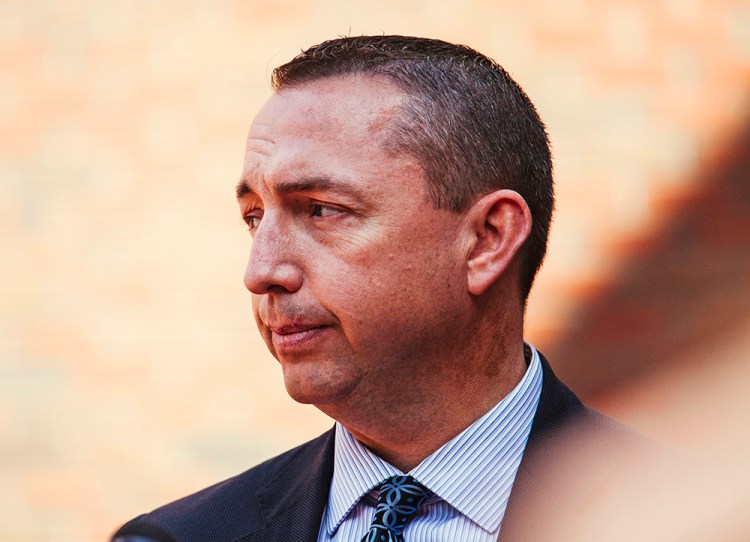Maine’s new concealed-carry law for firearms, a major victory for conservatives this past legislative session, goes into effect Thursday and some public safety officials already are urging caution.
Portland Police Chief Michael Sauschuck said Wednesday that he’s very concerned about the new law and thinks it will put his officers, and the public, at risk.
Sauschuck said officers responded just this week to reports of a man threatening others with a gun in the parking lot at the Northgate shopping plaza.
By the time police arrived, the people who were allegedly threatened had left, but the man with the gun, 58-year-old Peter Shepard of Portland, was still there and still holding a loaded .45-caliber handgun. Because Shepard did not have a permit, he was arrested and charged but Sauschuck said that, as of Thursday, having no permit will no longer be against the law.
“This will make our jobs more difficult,” the chief said. “I think this law was misguided. We continue to go the wrong way on gun legislation.”
The new law, passed in June after significant debate in both the House and Senate, makes Maine just the sixth state in the country to allow gun owners over the age of 21 to carry a concealed weapon without a permit. Alaska, Arizona, Kansas, Vermont and Wyoming are the others. The remaining 44 states all require permits to carry concealed weapons. New Hampshire lawmakers tried to pass a bill similar to Maine’s this year but Gov. Maggie Hassan vetoed it.
During the public hearing on the Maine bill, law enforcement officials were divided. The Maine Chiefs of Police Association and the Maine Sheriffs Association were opposed, but Maine State Police supported the measure, as did Gov. Paul LePage.
Sen. Eric Brakey, R-Auburn, the bill’s sponsor, said he’s proud of the new law and dismissed criticism.
“I’ve heard from people who love it and people who have concerns,” he said. “No one (legislative) district is made up of a monolithic block of people. But even those with concerns I’ve been able to talk to and explain what this does.”
Before the new law, Mainers needed permits to carry concealed weapons. No permit was needed to openly carry a firearm in public, although that occurred rarely.
Sauschuck said he’s worried that the new law will encourage people to carry concealed weapons who wouldn’t have otherwise.
Maine State Police said in April that 36,000 concealed handgun permits, including 12,000 for non-residents, had been issued by the state. The total number is likely much higher because permits are also issued by local police and there is no centralized registry.
Brakey, though, said concealed weapons permits created a false sense of security and were unnecessary.
“A criminal is not going to get a permit. He’s going to break the law,” Brakey said. “The same goes for gun-free zones. Criminals are not going to obey these zones.”
Dropping the permit requirement, Brakey said, simply removes the barrier for law-abiding people to carry firearms for self-defense. He said it’s important to note that people who are prohibited from possessing weapons are still prohibited and locations where no guns are allowed, such as public schools or federal buildings, will still be off-limits.
Adam Foster, a shooting instructor at Weaponcraft in Saco, said he lived in Alaska for many years, another state that allows concealed-carry without a permit.
“The world continued to turn round and round. Nothing changed, really,” he said. “There were no wild, crazy gunfights in the street.”
Maine’s crime rate, according to 2013 FBI statistics, was the second-lowest in the nation, behind only Vermont, which has allowed residents to concealed-carry for two centuries.
Under the Maine law, a concealed carry permit will now be optional, but Uel Gardner, one of the owners of Weaponcraft, said he knows many people who will continue getting a permit so that it will be easier for them to carry in other states that require them. Gardner said he supports Maine’s new law but understands the concerns, too. He believes everyone who carries a firearm should be well-trained.
“There are going to be a lot more uneducated and untrained people carrying firearms,” he said.
Even people who get concealed permits don’t always act appropriately.
Last week in Michigan, a woman fired several rounds from her 9-millimeter handgun at a vehicle driven by a man suspected of stealing merchandise from a home goods store. The woman was charged with reckless use of a firearm, a misdemeanor. Although the woman had a concealed-carry permit, the story generated discussion about whether more people might respond similarly if it is easier to carry a weapon. The general threshold for police officers and concealed weapons holders is that deadly force is allowed only if there is the imminent danger of death or harm to themselves or others.
Sauschuck said he’s worried about such cases, and about people exercising good judgment. He said he believes having more guns is not the answer. He also pointed out that the man who was arrested this week had altered his handgun using pink paint, ostensibly to make it look like a toy.
The longstanding debate over guns and access tends to reignite each time there is a tragedy involving a firearm.
A mass shooting at a community college in Oregon this month in which 10 people died, including the gunman, led to renewed calls for stricter gun control from some advocates, including President Obama, but also hardened the opinions of 2nd Amendment backers who believe more gun regulations are not the answer.
Gun rights supporters have often urged policymakers to focus on mental illness and better treatment as an antidote to gun violence.
Send questions/comments to the editors.




Comments are no longer available on this story